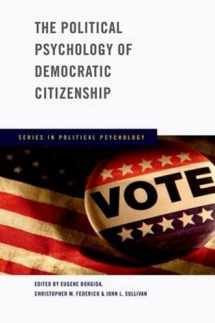
The Political Psychology of Democratic Citizenship (Series in Political Psychology)
Book details
Summary
Description
While scholars in political science, social psychology, and mass communications have made notable contributions to understanding democratic citizenship, they concentrate on very different dimensions of citizenship. The current volume challenges this fragmentary pattern of inquiry, and adopts an interdisciplinary approach to the analysis of citizenship that offers new insights and integrates previously disparate research agendas. It also suggests the possibility of informed interventions aimed at meeting new challenges faced by citizens in modern democracies.
The volume is organized around five themes related to democratic citizenship: citizen knowledge about politics; persuasion processes and intervention processes; group identity and perception of individual citizens and social groups; hate crimes and intolerance; and the challenge of rapid changes in technology and mass media. These themes address the key challenges to existing perspectives on citizenship, represent themes that are central to the health of democratic societies, and reflect ongoing lines of research that offer important contributions to an interdisciplinary political psychology perspective on citizenship. In several cases, scholars may be unaware of work in other disciplines on the same topic and might well benefit from greater intellectual commerce. These themes provide excellent opportunities for the interdisciplinary cross-talk that characterizes the contributions to this volume by prominent scholars from psychology, political science, sociology, and mass communications. In the final section, distinguished commentators reflect on different aspects of the scholarly agenda put forth in this volume, including what this body of work suggests about the state of political psychology's contributions to our understanding of these issues.
Thus this volume aims to provide a multifaceted, interdisciplinary look at the political psychology of democratic citizenship. The interdisciplinary bent of contemporary work in political psychology may uniquely equip it to create a more nuanced understanding of citizenship issues and of competing democratic theories.


We would LOVE it if you could help us and other readers by reviewing the book
Book review



